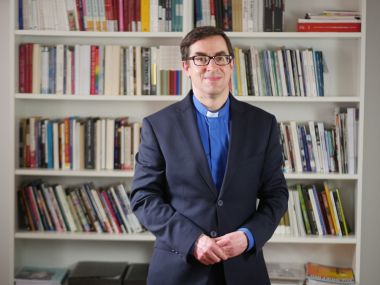Sacked chaplain to appeal after losing employment tribunal case

A Church of England chaplain has called an employment tribunal ruling against him a blow for freedom of speech and Christian freedoms.
Rev Dr Bernard Randall took his employer Trent College, in Nottingham, to court for discrimination, harassment, victimisation and unfair dismissal after being fired following a sermon he gave to students in which he said they did not have to agree with LGBT ideology.
After preaching the sermon in the school's chapel, he was interrogated by the school, reported to the government's terrorist watchdog, Prevent, and subjected to a campaign of censorship.
He was also barred from officiating in the Church of England after being deemed a safeguarding risk by his local diocese, despite his views being in line with the Church's own Canon Law, liturgy and the Book of Common Prayer, which uphold marriage as a lifelong union between a man and a woman.
Following a hearing at East Midlands Tribunal last September, Judge Victoria Butler ruled against Dr Randall.
In an extraordinary judgment, she said, "The duty to safeguard pupils from the risk of harm and the requirement to comply with the Independent Schools Standards Regulator outweigh the Claimant's right to express his beliefs in the manner he did in a school environment."
She continued, "We have already found that the message taken away by pupils was that it was wrong to be LGBT+ and okay to discriminate."
The judgment also upholds the college's decision to refer Dr Randall to Prevent.
"[The safeguarding officer] has extensive experience in her field. She gave evidence that she is trained to look for indicators of radicalisation and recognise when someone was becoming radicalised long before they reach the point where terrorism is reached. She explained that there was 'a continuum which is quite a long journey'," the judgment reads.
"The referral arose because of the objectionable way in which the Claimant manifested his beliefs and was justified because of the need to take a cautious approach from a safeguarding perspective."
Judge Butler added that the safeguarding officer "was concerned that the Claimant's deeply held belief that Canon law took precedence over the welfare of pupils and staff fell under the remit of Prevent."
Dr Randall said he was "extremely disappointed" with the outcome.
"It is a personal blow, but more importantly, it is a blow for all those who believe in freedom of speech, in freedom of religion, and in an educational system which opens the minds of young people rather than narrowing them or imposing an ideology that many or most in our society find troubling," he said.
"It is a foundational principle of a truly democratic society that the free exchange of ideas is good for everyone.
"In this case, mainstream Christian beliefs about marriage are held by a minority in society, albeit a substantial one. They are hardly extreme: they arise out of God's deep love for all people, and his desire for full human flourishing. They deserve to be taken seriously.
"On the other hand, the beliefs of gender identity ideology are themselves held by a minority, and are controversial to say the least. They also deserve to be taken seriously. However, it cannot be right for a school to teach them as if they are undisputable facts, and to shut down those who wish to take an open thoughtful approach to the well-being of young people.
"No belief is above scrutiny or discussion which respects the integrity of those who hold beliefs different than our own. But discussion needs different voices to be heard. Knee-jerk rejection of beliefs with which we disagree, and the demonisation of those who hold them, has no place in a modern democracy. It certainly does not reflect the love for our neighbours which Jesus wants us to show.
"The Tribunal's ruling makes the free exchange of ideas in schools, and in wider society much harder. I understood that the whole point of the Equality Act is to protect minorities. It feels today as if Christians are one minority who are not afforded that protection, and I believe that is wrong on every level."
Andrea Williams, chief executive of the Christian Legal Centre, which supported Dr Randall in his case, said the judgment effectively means there is no freedom to disagree with LGBT teaching.
"We cannot permit this judgment to stand. It is neither a rational judgment nor an impartial one. It reads as a promotional piece for Queer theory," she said.
"This judgment is tragic for Dr Randall but we are encouraging him and all faithful clergy and lay members in the Church of England who believe in biblical truth to stand firm. This outcome is not the end of the matter. We will not rest until this kind of censorship of biblical teaching ends.
"The message from this judgment to Christians is you cannot disagree or express disagreement with LGBT teaching – you must comply, celebrate and promote. It is not enough to be tolerant and liberal in the original sense of those words. You have to actively promote and celebrate."











